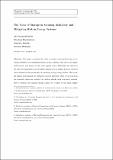The value of storage in securing reliability and mitigating risk in energy systems
Author(s)
ParandehGheibi, Ali; Roozbehani, Mardavij; Dahleh, Munther A.; Ozdaglar, Asuman E.
Download12667_2014_127_ReferencePDF.pdf (510.1Kb)
OPEN_ACCESS_POLICY
Open Access Policy
Creative Commons Attribution-Noncommercial-Share Alike
Terms of use
Metadata
Show full item recordAbstract
The paper examines the value of ramp-constrained storage in securing reliability and mitigating risk in energy systems with uncertain supply and demand, and friction in the main supply source. Reliability is defined as the expected discounted cost of energy deficits over an infinite horizon, whereas risk is defined as the probability of incurring a large energy deficit. The nominal supply and demand are assumed to match perfectly, while deviations from the nominal values are modeled as random shocks with stochastic arrivals. Due to friction, the random shocks cannot be tracked by the main supply sources. Storage, on the other hand, is assumed frictionless as a supply source and can be used to compensate for the energy deficit shocks, though it cannot be filled up instantaneously. The storage control problem is formulated as an optimal control problem with the objective of maximizing system reliability. It is shown that when the stage cost is linear in the size of the energy deficit, the optimal control policy is myopic in the sense that all deficit shocks will be compensated up to the available level of storage. However, when the stage cost is strictly convex, it may be optimal to accept a small energy deficit in the interest of maintaining a higher level of reserve, which can help avoiding a large energy deficit in the future. The value of storage capacity in improving reliability, as well as the effects of the associated optimal policies under different stage costs on risk, i.e., the tail distribution of large energy deficits are examined.
Date issued
2014-06Department
Massachusetts Institute of Technology. Department of Electrical Engineering and Computer Science; Massachusetts Institute of Technology. Laboratory for Information and Decision Systems; Massachusetts Institute of Technology. Research Laboratory of ElectronicsJournal
Energy Systems
Publisher
Springer Berlin Heidelberg
Citation
ParandehGheibi, Ali, Mardavij Roozbehani, Munther A. Dahleh, and Asuman Ozdaglar. “The Value of Storage in Securing Reliability and Mitigating Risk in Energy Systems.” Energy Systems 6, no. 1 (June 19, 2014): 129–152.
Version: Author's final manuscript
ISSN
1868-3967
1868-3975